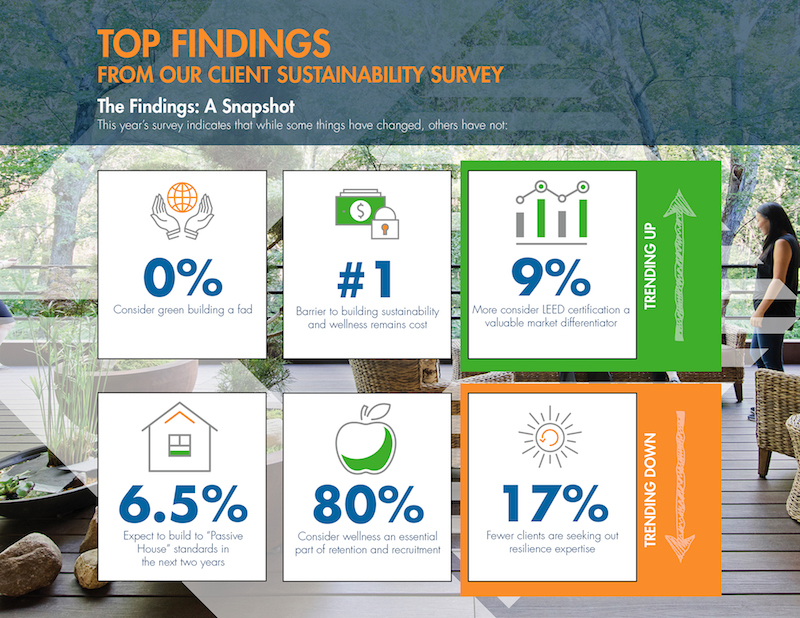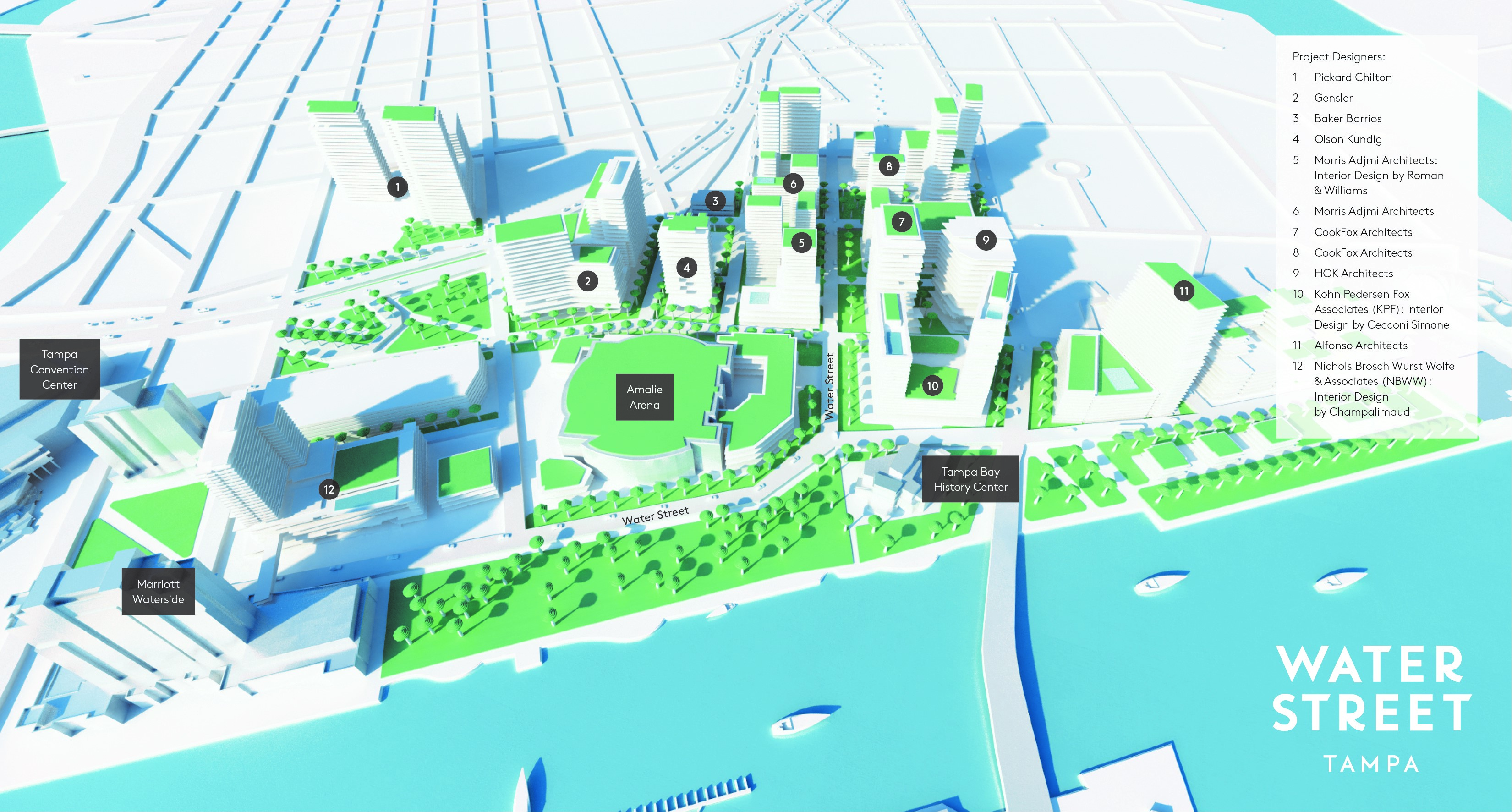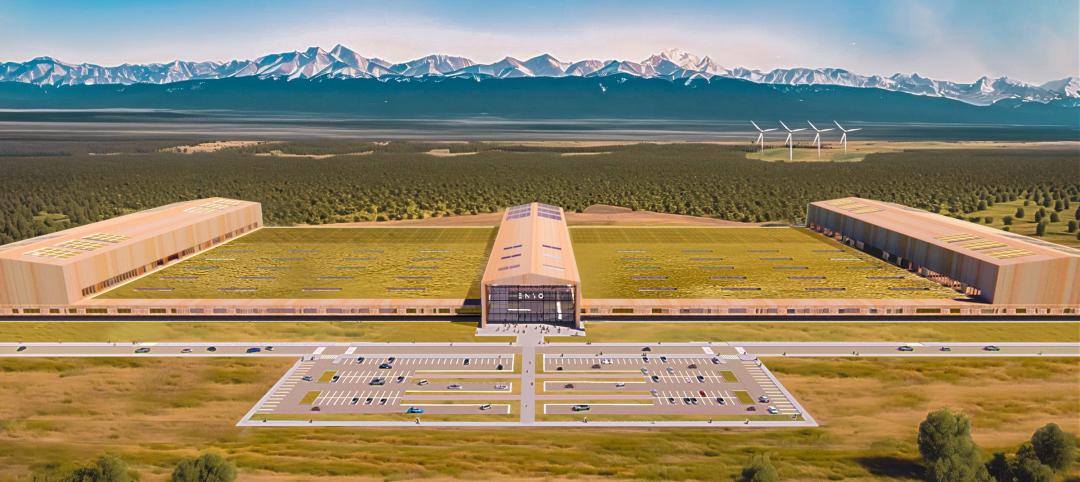After a summer of tumultuous and severe weather events that wreaked havoc on the Caribbean and the Southern United States, a certain segment of real estate and property managers still doesn’t see the value of incorporating resilience into their buildings or their operations.
That’s one of the key findings in Structure Tone’s second-annual Client Sustainability Report. The construction management firm polled a select group of 140 senior corporate real estate and facilities management professionals to gauge where sustainability comes into play for end users across the commercial real estate community.
Based on their responses, it would appear that “green building” is now mainstream. None of the respondents consider it a fad. More than three-fifths—62%—see LEED certification as a market differentiator, up nine percentage points from last year’s survey. And more than half of those polled agree that employees expect the buildings they work in to be LEED-certified.
Indeed, 45% of those polled said they would pay more to lease space in a green building. And 42% expressed concern about where their buildings rank in public energy disclosers.
“Last year there was a concern that when LEEDv4, a more stringent version of LEED, was implemented, many owners would simply stop pursuing certification. But our results show that’s simply not the case,” says Jennifer Taranto, LEED AP ID+C/BD+C, WELL AP, Structure Tone’s director of Sustainability.

Sustainability is becoming mainstream, and LEED certification is still the gold standard in commercial real estate, according to Structure Tone's survey. Image: Structure Tone.
That being said, the No. 1 barrier to building green remains its cost for an overwhelming number of those polled. And there are still limits to how green the real estate and property management communities want to take their buildings. Only 11% of the survey respondents said their companies have policies that support progress toward Net-Zero Energy in the building sector. This is a slight downward movement from the previous year of 15%. “Surprisingly, 31% of respondents did not know if they have real estate in cities that have community-wide Net Zero goals,” Structure Tone reports.
Cost might also explain why the number of respondents who think resilience is important fell to 54%, from 61% last year. And 17% fewer respondents said they are seeking resilience expertise on their projects. (The survey was open to responses from March 1 through June 19, just months before Hurricanes Harvey, Irma, and Maria did their damage, and an 8.1-magnitude earthquake rocked Mexico City.)
Taranto tells BD+C that she was “surprised” by the lower responses about resilience. However, she also notes that the survey is in line with attitudes Structure Tone continues to encounter in the field from some clients that have yet to give resilience closer scrutiny.
Conversely, more real estate and property management professionals are embracing wellness as a standard for their buildings to pursue. More than 80% of those polled cited wellness as a relevant factor in recruiting and retaining employees. More than half of the respondents said they planned to seek expertise to devise wellness strategies for their buildings.
“Wellness is certainly coming to the forefront,” says Taranto.
Leading this charge is the International WELL Building Institute, which has developed wellness standards for buildings and communities. Water Street Tampa—a $3 billion mixed-use district under construction in Florida that BD+C reports on in a feature article about resilience in our October 2017 issue—on September 5 launched a pilot of the WELL Community Standard. This project, which when completed will have more than 9 million sf of commercial and residential space, is targeting to be the world’s first WELL-certified community.
One-quarter of respondents to Structure Tone’s survey said they were looking to do a WELL project within the next year.
In Structure Tone’s survey, 70% of the respondents work at companies with more than 1,000 employees. Two-thirds of those polled have square footage responsibilities that exceed 1 million sf. The top sector responses came from commercial office, data centers, healthcare, and pharma/life sciences.
Related Stories
Sustainable Design and Construction | Oct 10, 2024
Northglenn, a Denver suburb, opens a net zero, all-electric city hall with a mass timber structure
Northglenn, Colo., a Denver suburb, has opened the new Northglenn City Hall—a net zero, fully electric building with a mass timber structure. The 32,600-sf, $33.7 million building houses 60 city staffers. Designed by Anderson Mason Dale Architects, Northglenn City Hall is set to become the first municipal building in Colorado, and one of the first in the country, to achieve the Core certification: a green building rating system overseen by the International Living Future Institute.
Office Buildings | Sep 6, 2024
Fact sheet outlines benefits, challenges of thermal energy storage for commercial buildings
A U.S. Dept. of Energy document discusses the benefits and challenges of thermal energy storage for commercial buildings. The document explains how the various types of thermal energy storage technologies work, where their installation is most beneficial, and some practical considerations around installations.
Industrial Facilities | Aug 28, 2024
UK-based tire company plans to build the first carbon-neutral tire factory in the U.S.
ENSO, a U.K.-based company that makes tires for electric vehicles, has announced plans to build the first carbon-neutral tire factory in the U.S. The $500 million ENSO technology campus will be powered entirely by renewable energy. The first-of-its-kind tire factory aims to be carbon neutral without purchased offsets, using carbon-neutral raw materials and building materials.
Government Buildings | Aug 19, 2024
GSA posts new RFI for enabling energy efficiency, decarbonization in commercial buildings
The U.S. General Services Administration (GSA), in collaboration with the U.S. Department of Energy, recently released a new Request For Information (RFI) focused on enabling energy efficiency and decarbonization in commercial buildings. GSA wants to test innovative technologies through GSA’s Center for Emerging Building Technologies.
Adaptive Reuse | Aug 14, 2024
KPF unveils design for repositioning of Norman Foster’s 8 Canada Square tower in London
8 Canada Square, a Norman Foster-designed office building that’s currently the global headquarters of HSBC Holdings, will have large sections of its façade removed to create landscaped terraces. The project, designed by KPF, will be the world’s largest transformation of an office tower into a sustainable mixed-use building.
Sustainability | Aug 14, 2024
World’s first TRUE Zero Waste for Construction-certified public project delivered in Calif.
The Contra Costa County Administration Building in Martinez, Calif., is the world’s first public project to achieve the zero-waste-focused TRUE Gold certification for construction. The TRUE Certification for Construction program, administered by Green Business Certification Inc. (GBCI), recognizes projects that achieve exceptional levels of waste reduction, reuse, and recycling.
Energy Efficiency | Aug 9, 2024
Artificial intelligence could help reduce energy consumption by as much as 40% by 2050
Artificial intelligence could help U.S. buildings to significantly reduce energy consumption and carbon emissions, according to a paper by researchers at the Lawrence Berkeley National Laboratory.
Green | Aug 7, 2024
Major cities worldwide set building performance standards
Cities around the world are setting building performance standards (BPS) as a key measure to cut emissions and meet climate targets, according to a report from JLL.
Smart Buildings | Jul 25, 2024
A Swiss startup devises an intelligent photovoltaic façade that tracks and moves with the sun
Zurich Soft Robotics says Solskin can reduce building energy consumption by up to 80% while producing up to 40% more electricity than comparable façade systems.
Sustainability | Jul 18, 2024
Grimshaw launches free online tool to help accelerate decarbonization of buildings
Minoro, an online platform to help accelerate the decarbonization of buildings, was recently launched by architecture firm Grimshaw, in collaboration with more than 20 supporting organizations including World Business Council for Sustainable Development (WBCSD), RIBA, Architecture 2030, the World Green Building Council (WorldGBC) and several national Green Building Councils from across the globe.

















